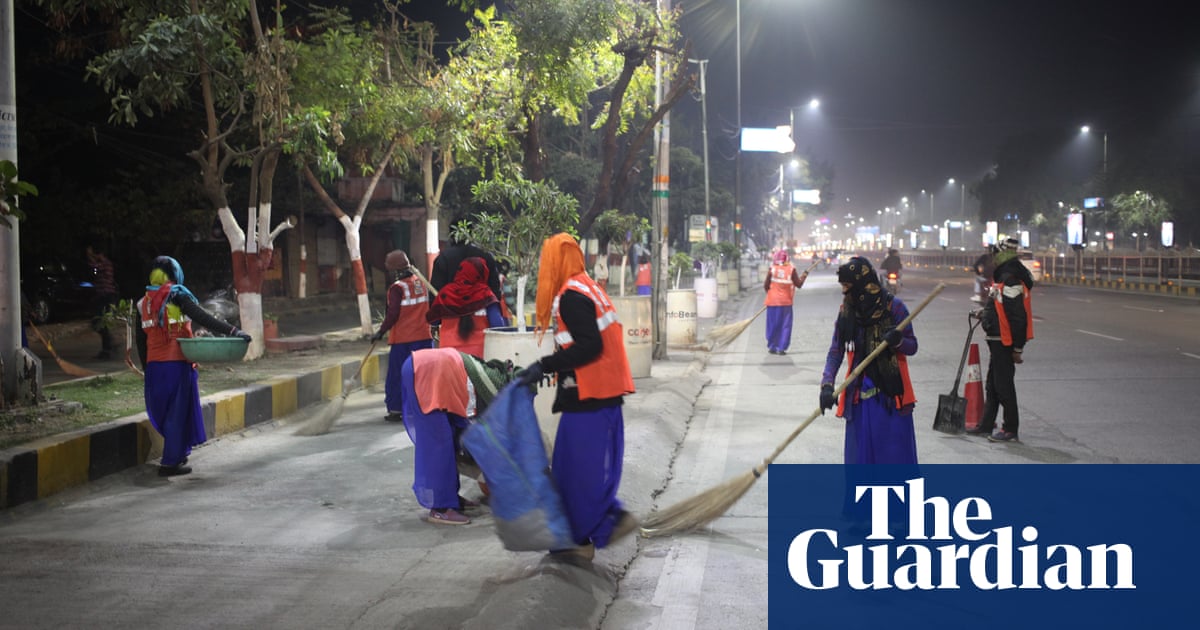By now, nearly 21 months after Taylor Swift launched what would become the highest-grossing tour of all time, you could be forgiven for thinking both “wait, Taylor Swift is still on the Eras Tour?” or that the globe-spanning, headline-dominating, literally seismic show would go on for ever.
After all, the Eras era has spanned an epoch, at least in ever-quickening internet time. But after 152 shows, 10-plus million fans and several pop cultural takeovers, the Eras Tour reached the end of its road in fittingly rainy Vancouver, having become the highest-grossing tour of all time – though total revenue figures have not been released.
Not that you would know it from downtown, which – like every city before it in the US, Australia, Asia, Europe and finally Canada – morphed into a temporary mecca for hundreds of thousands of sequined, jubilant Swifties. Much has been said about how the Eras Tour became its own two-year economic stimulus, but it is still staggering to witness Swiftonomics in person. According to the unscientific estimate of a US border agent who asked me how Taylor was before even looking at my passport, “99.5%” of vehicles crossing between the US and Canada this weekend were heading to and from the three shows. (Perhaps he saw all the friendship bracelets passed between cars in traffic). Light-up lyrics adorned the streets leading to BC Place; you could not go to a Starbucks in town without seeing women in Eras Tour merchandise.
“The energy is just … I think everybody is feeling it,” said Maline Davis, 27, of St Louis, Missouri, at a loss for words over the last show. “This is a once-in-a-lifetime experience. I just don’t know that this will happen again.”

Probably not, at least not in this way. The Eras Tour – a stupefying spectacle of ambition, self-mythology and sheer prodigiousness that covers somewhere between 45 and 50 songs in three and a half hours – was a special alchemy of ridiculously prolific artist, uniquely devout fanbase, mass cultural appeal and simmering desire to return to large concerts post-Covid. With it, Swift redefined the scope of a music tour: how much money it could make, how much extra-textual lore it could produce and absorb, how long it could last. I reviewed the first show in March 2023 in Glendale, Arizona, way back when TikTokers predicted a two-hour show. That night, the friend I took with me told me she was pregnant; her daughter is now a walking, talking toddler.
In that period, Swift inadvertently challenged the monopoly of Ticketmaster/LiveNation, headlined the first billion-dollar tour (total revenue figures have not yet been released) and turned the show into an industry-shifting concert film. The Eras Tour mutated to include a new album, a new boyfriend and new rereleases in Swift’s ongoing quest to reclaim ownership of (and evermore attention on) her back catalogue. She became both the mainstream and social media main character of 2023, careened through overexposure and landed in the astral plane of uncharted, generally unfathomable mega-celebrity. The Eras Tour “just took over everything. It was all everyone could talk about”, said Davis’s sister Addie, 24. “I just can’t believe that this is the last weekend.”
For the entirety of its run, getting tickets was an infamously gruelling gauntlet and, for many, the final dates were less sentimental than practical. “We didn’t even realise that it was going to be the last weekend,” said Hayley, 19, who came with her family from Dayton, Ohio, after they were unable to get tickets for the regional show in Cincinnati. Danielle Barnard was supposed to attend a London show in June with her 13-year-old daughter, Emerson, but couldn’t fly from Seattle after Emerson, who has a heart condition, suffered a cardiac arrest. “I’m just happy to get her here, after everything,” she said. “We’re here to celebrate.” Cora, 31, of Vancouver, made it to her first show a year after she “won the great war” on Ticketmaster. “I would never say I’m a 10/10 [Swiftie], because I wouldn’t sell a limb,” she said of her devotion, “but did I spend a lot of money and will I cry? Yes.”

Everyone, without fail, had already seen the show, whether via the concert film or the millions of recordings chopped and lavished and dissected online. Outside the stadiums, these recordings became a type of post-reality TV – the Eras Tour as an ever-mutating, interactive, increasingly meta show producing new lore each week that Swift folded back into the tour. Starting with this summer’s European leg, the modified set list includes The Tortured Poets Department, the record-breaking album she released in April that reveals, in typical diaristic fashion, the artist’s personal tumult during the glittering, seemingly triumphant early era of the Eras Tour. It is surreal to watch Swift sing I Can Do It With a Broken Heart, a shimmering ode to how functionally depressed she was during the early shows, as she was telling fans she was having the time of her life, to the same fans who watched the whole time.
If anything, the dissonance intensified the reverence. In its second year, the Eras Tour settled into a semi-religious event. Fans ritualised the show with Rocky Horror-esque timed participation – when to shout out unofficial additional lyrics, when to hold up one’s phone flashlight (and, for the track Willow, a little balloon over the flashlight). When to give the eardrum-shattering, minutes-long ovation so that Swift can bask, earpieces out, in the worship that she built.
“I decided to make this tour the longest tour I’ve ever done because you have made this feel like so much more than a concert tour,” she said on stage Friday night. And by all measures – crowd size, profit, set list, content creation, fan devotion – it was. I watched a Swiftie boyfriend delete photos on his phone to make room to record the whole show. Multiple people Facetimed loved ones in. Others screamed every word in a familiar yet still unbelievable swirl of ecstatic sound. “I didn’t record much this time, because I wanted to just take it in,” said Maline Davis. I did, too, with my childhood best friend, and left feeling dazed – by the brain-scorching screams, by the baffling passage of time, by the incomprehensible scale of it all, by the end of an era.

.png) 3 months ago
29
3 months ago
29













































